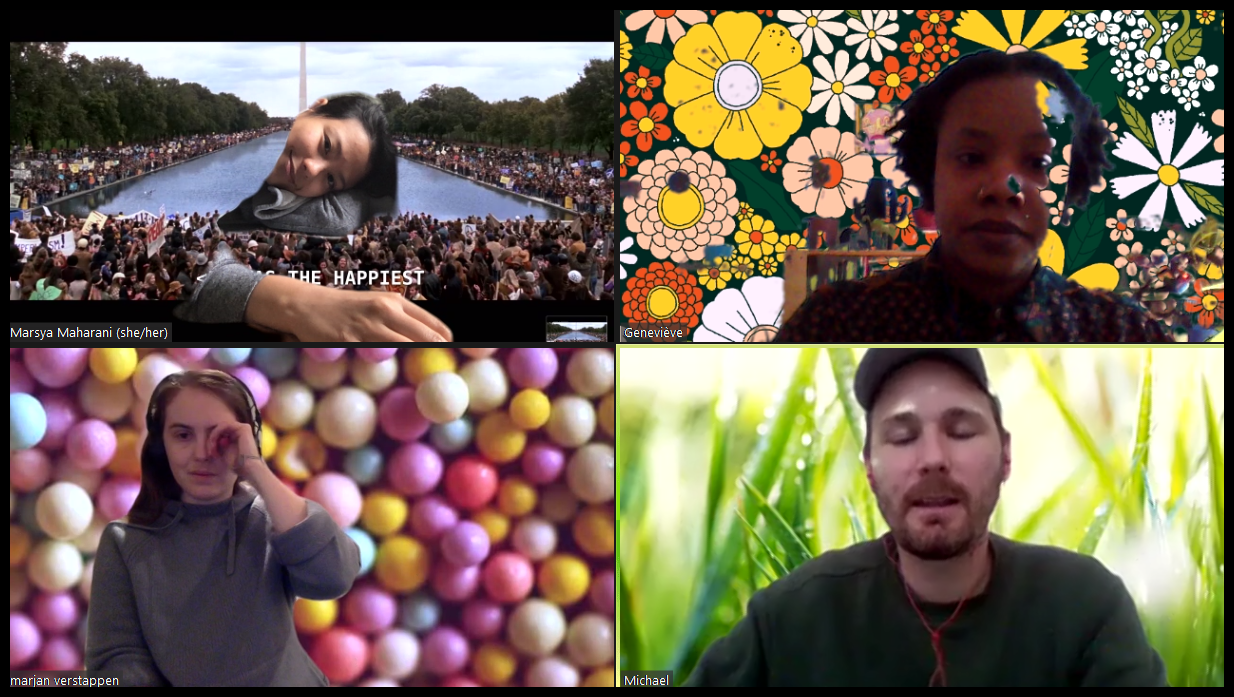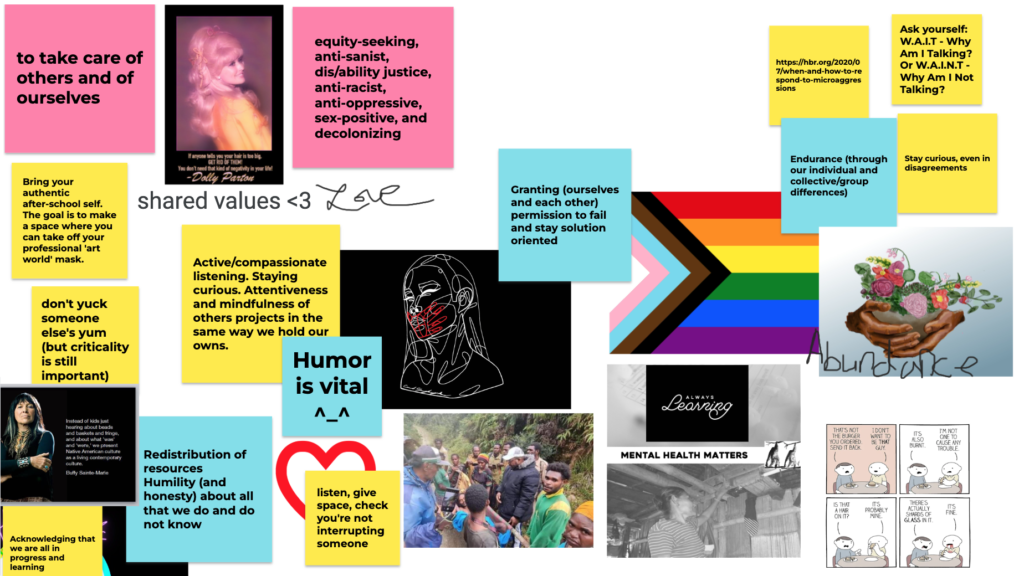Process
March – October 2020
During the start of the pandemic, YTB regularly met online to process our new realities. We used existing grant deadlines as prompts to dream up our collective futures. Cyber Fellows came out of a desire to support other spaces of collective dreaming for those who are graduating remotely and those who may find it challenging to find collaborators in the context of the navigating stay at home measures.

We wanted to create a digital residency for emerging artists to:
- Explore alternatives to costly, rigid graduate programs in the arts.
- Learn things that are vital to the conditions of working and making as an artist today, but are never addressed in school.
- Collaborate, rather than compete.
- Connect across Turtle Island and globally.
June 2021 – February 2022
YTB and Pulse Lab met with artists, cultural producers, and educators who have carried out pedagogical projects that also focused on peer-learning and collaboration.
These include:
- Alice Yuan Zhang, Anise Hines, and Amanda Vincelli who shared about Assemblies, community-led learning groups that engage with social, economic, and environmental justice issues.
- Caroline Woolard, whose work in cooperative organizing, solidarity economy, and artist-led systems-change includes the co-founding of Trade School, which operated on a barter system, and art.coop, a space for cultural workers to co-learn and connect via study groups, mutual aid groups, community land trusts, time banks, credit unions, community wealth cooperatives, and more.
- Sean J Patrick Carney, an artist, writer, and educator who spoke about his time at Bruce High Quality Foundation University and his current approach to teaching.
- Sarah Adefehinti and Ellie Osborne who discussed Enrol Yourself (now Huddlecraft), a social enterprise platform for low cost peer-led learning.
Furthermore, we explored the possibilities of building a community-based DAO by talking to Rosemary Heather and Tao Fei from the Vancouver artist-run centre 221A, the Berlin-based media arts team Black Swan, and Jae-Hee Bae and Safder Raza from Dream Dao.
We also met with Suzanne Stein of the Super Ordinary Lab, who developed a project management tool that revises the RASCI model of role division. Rather than a top-down method of assigning workflow, Super O’s methodology for organizing collective workflow allows for self-management and the flexibility that honors people’s changing capacities. This model is called CARPSI and refers to the various roles that each collective member can self select according to their level of interest and availability. The roles that were useful for this project were Catalyst, Active (Core Working Group Members), Resourcer, and Informed. We rotated in and out of these roles throughout the project.
Artist and scholar Katie Huckson from Pulse Lab analyzed these interviews and helped us formulate the priorities and approaches we would test out through Cyber Fellows.
We then began to develop the program’s parameters, timeline, and open call with Gudskul and Flux based on people’s capacities and research interests. YTB and Gudskul have been working together since 2018. Gudskul invited YTB to be a part of their exhibition and co-learning network, Knowledge Garden, at the Art Gallery of York University. YTB is grateful to Gudskul for introducing us to lumbung and nongkrong, their methodologies for long-term knowledge-sharing and friendship-building. Lumbung is an Indonesian word for an agricultural practice whereby surplus harvests are collected in a communal barn and redistributed based on the needs of community members. Gudskul’s operations and projects take this concept as a model of operating under the logic of the commons. Nongkrong – “hanging out” – presents “organic possibilities for knowledge dissemination,” whereby the simple act of being together enables participants to exchange ideas, develop friendships, build trust, eat together, cook for each other, and practice collectivity and reciprocity.
We learned that we wanted to experiment with:
- Prioritizing process: A final output is not necessary. We wanted to provide a space for exploration. Fellows who wish to share their research during this project can produce a resource for the Cyber Fellows platform, but it is by no means mandatory.
- Togetherness: As the project is about gathering and peer-learning, the selection process centred the needs, interests, and online personalities of the Fellows.
- Majelis (Assembly): From our work with Gudskul, we learned about the Majelis model of organizing gatherings in which any team member can take up various roles for each meeting. These include Head of Majelis (responsible for checkin and checkout activities and the flow of the meeting), Graphic Recorder (taking visual notes), Harvester (taking notes), and Time Keeper. Taking turns open up the space for horizontality and facilitate the process of getting to know each other better.
- Lumbung (Collective Pot): Also adapted from Gudskul’s methodology of collective resource management, we invited the Fellows to approach budgeting horizontally. Therefore, every project’s budget had to be approved by the group.
March – June 2022
We had 14 online meetings for playful relationship-building activities, workshops, and breakout room discussions to talk about each other’s projects.
- In our first meeting YTB introduced the program’s guidelines and presented a blank syllabus for Fellows to indicate the topics they are interested in teaching or exploring. We then followed up with one-on-one meetings between YTB members and each of the Fellows.
- Based on requests from the collectives and ideas from our co-facilitators, we invited speakers to present on different topics related to anti-oppressive community engagement methodologies, somatic budgeting, and collective work.
- Each collective was encouraged to connect with a mentor whom they felt had the expertise they needed. They each had a budget to fairly compensate for their mentor’s time, and created their timelines and goals for this mentorship. Fellows based in Indonesia worked with Gudskul as their mentors.
- Each collective developed their research process and decided what kind of educational resource they would like to share on our website.
Our Shared Values & Knowledges
June – September 2022
During this phase, the Fellows who opted to produce a resource for this website did so in a self-directed manner. Meanwhile, YTB folks and Katie Huckson took the time to reflect on the process and develop a platform that would suit the Fellows’ projects. We invited Fellows to check-in with us from time to time, to support them in moving along in their research.
YTB also visited Gudskul at documenta fifteen in Kassel, Germany, and at their home base in Jakarta, Indonesia, to learn how they implement values of collaboration in their daily operations. We were thrilled to also meet our Jakarta-based Fellows, as well as Meita’s collaborators, the women of RT04.
September – November 2022
We continued to work closely with each of the collectives who chose to share their research. In October, YTB had the pleasure to host an in-person meeting in Tkaronto/Toronto.
Meanwhile, YTB and Pulse Lab worked to produce this website by engaging experts in our network: Cyber Fellows’ own Harmeet Rehal as our Web Illustrator, Pulse Lab collaborator Lauren Connell-Whitney as our Web Designer, and Gudskul’s Noorlintang “Nori” Suminar as our Social Media Illustrator.
Our time was elastic and while we had a broad timeline in mind, deadlines were staggered based on our check-ins with our website collaborators and the Fellows. In the process, we prioritized the well-being of everyone involved in conceptualizing Cyber Fellows’ public output. There is no such thing as an art emergency
What’s next?
YTB is taking 2023 to reflect and fundraise for the next editions of Cyber Fellows. Despite our best intentions, there are plenty of lessons to learn from this pilot edition. Mairead Stewart and Katie Huckson from Pulse Lab wonderfully conducted post-mortem interviews with a number of generous Fellows, which will guide us on how to grow this project in the future. In the meantime, see our Open Letter to Future Co-Conspirators to speculate and scheme with us.
